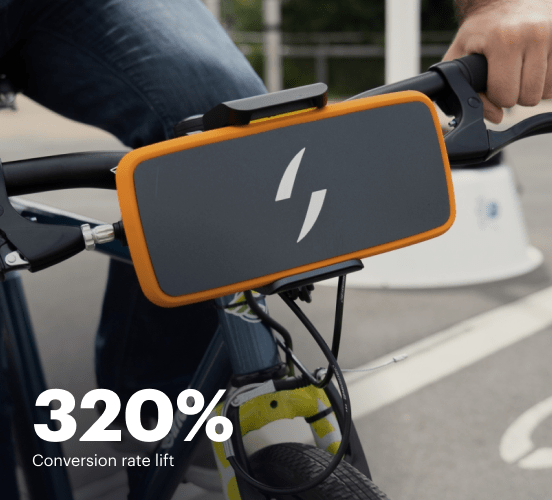Webflow vs. Wix: the best platform for a seamless web experience
Discover how Webflow compares to Wix regarding features and usability. Find out which platform provides the competitive advantage your business deserves.
Get startedSee how Instapage stacks up against the competition
| Feature | Instapage | Other builders |
| Drag-and-Drop Tools | ||
| Conversion-optimized templates | ||
| Manual and AI-powered A/B Tests | ||
| AI content suggestions | ||
| Popups and sticky bars | ||
| Canvas and grid blocks | ||
| Reusable and global elements | ||
| Form and popup builders | ||
| Built-in Heatmaps | ||
| Central analytics dashboard | ||
| Ad-to-page personalization and collections | ||
| Contacts, lists, and email | ||
| Dedicated, full-service CRO experts | ||
| Enterprise-ready platform |
Leading the way in building high-performing landing pages





Why Instapage is the smarter choice for your campaigns
Get everything you need to build, scale, and optimize high-converting landing pages—without coding.
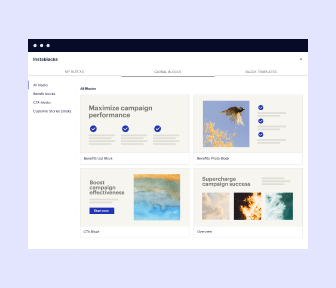
Easier page building without coding
Instapage offers a flexible and seamless page creation experience with a library of 500+ conversion-focused layouts, Instablocks®, a drag-and-drop builder, and AI content generation. With technologies like Thor Render Engine®, you can create on-brand, mobile-responsive landing pages that load quickly and start converting during initial visitor clicks.
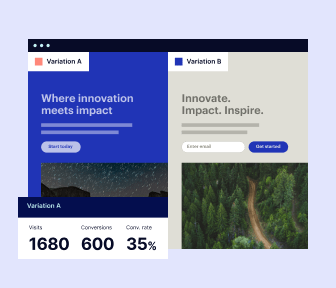
More insights — better results
Instapage lets you see in detail how each landing page experience and variation is performing so you can make targeted changes that boost page conversions. Use heatmaps for a better understanding of on-page activities, run A/B tests and AI-assisted experiments, and then track and evaluate results within robust analytics dashboards.
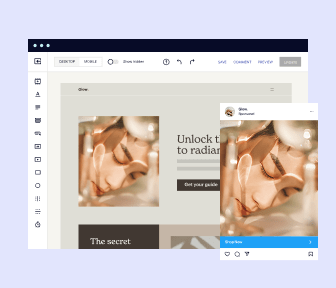
More personalized experiences
Instapage lets you quickly create high-performing landing pages tailored to each of your ad campaigns. Deliver personalized experiences for distinct audiences using dynamic text replacement. Effortlessly align specific advertisements to unique pages with AdMaps. Monitor audience-level metrics using our advanced data tools.
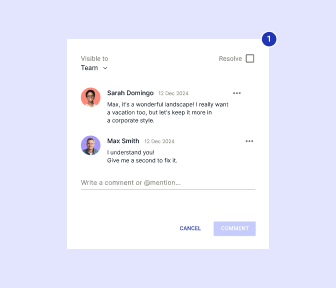
Built-in collaboration
Instapage collaboration capabilities bring your entire team together to speed up the process of landing page review, approval, and launch. No more frustrating and unnecessary revisions or edits scattered across emails. Provide instant feedback, conduct real-time page edits, and securely share your pages with outside stakeholders.
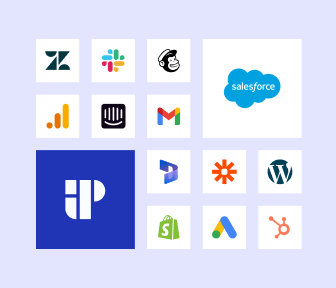
Free up time for your business
Invest time into business growth, not busy work. Launch landing pages faster with reusable forms and templates. Build once, reuse forever.
Explore all integrations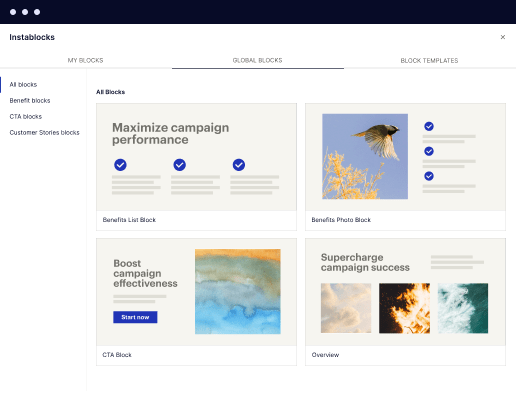
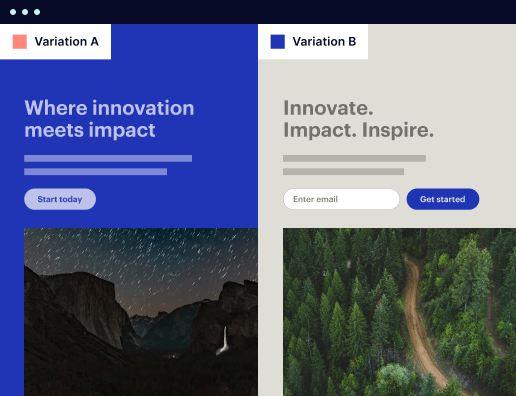
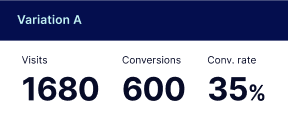
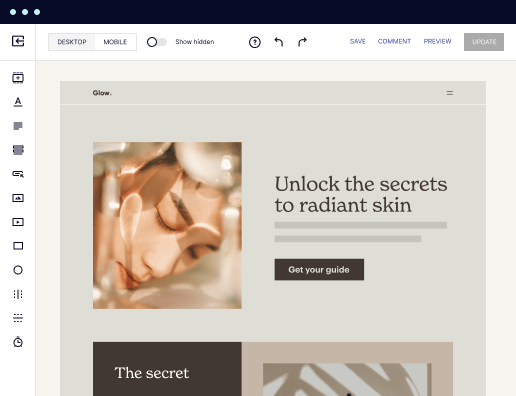

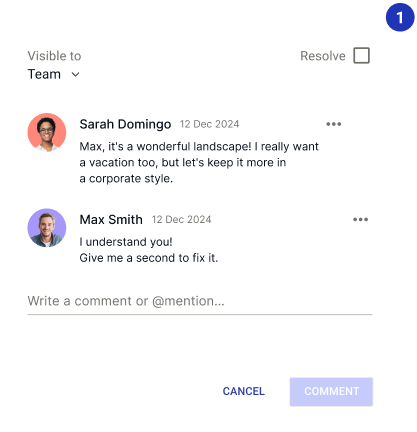
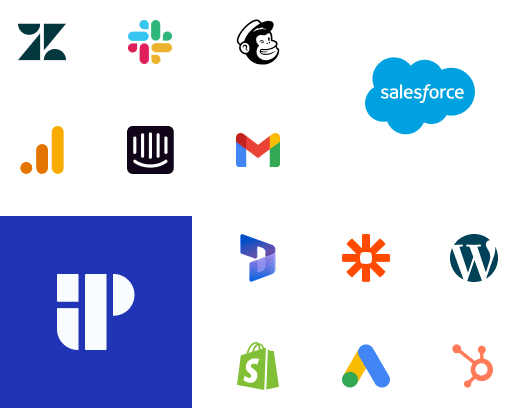
Easier page building without coding
Instapage offers a flexible and seamless page creation experience with a library of 500+ conversion-focused layouts, Instablocks®, a drag-and-drop builder, and AI content generation. With technologies like Thor Render Engine®, you can create on-brand, mobile-responsive landing pages that load quickly and start converting during initial visitor clicks.
More insights — better results
Instapage lets you see in detail how each landing page experience and variation is performing so you can make targeted changes that boost page conversions. Use heatmaps for a better understanding of on-page activities, run A/B tests and AI-assisted experiments, and then track and evaluate results within robust analytics dashboards.
More personalized experiences
Instapage lets you quickly create high-performing landing pages tailored to each of your ad campaigns. Deliver personalized experiences for distinct audiences using dynamic text replacement. Effortlessly align specific advertisements to unique pages with AdMaps. Monitor audience-level metrics using our advanced data tools.
Built-in collaboration
Instapage collaboration capabilities bring your entire team together to speed up the process of landing page review, approval, and launch. No more frustrating and unnecessary revisions or edits scattered across emails. Provide instant feedback, conduct real-time page edits, and securely share your pages with outside stakeholders.
Free up time for your business
Invest time into business growth, not busy work. Launch landing pages faster with reusable forms and templates. Build once, reuse forever.
Explore all integrationsGet started with Instapage in a few steps
-
Create your Instapage account
Start with Instapage by signing up via Google or your email. You'll get access to a free 14-day trial to discover Instapage capabilities. Feel free to cancel anytime during the 14-day trial if you decide that our product is not suitable for your business. -
Build and personalize your page
Create your first landing page from scratch or choose a template from 500+ customizable layouts. Use the drag-and-drop builder to add page elements, fonts, and backgrounds, refine content with AI, or add custom HTML, Javascript, and CSS. -
Review and make edits
Collaborate on page designs and streamline review processes. Invite your team members and stakeholders to review, edit, and provide feedback on your landing page. Collaborate knowing your page is confidential and only accessible to authorized users. -
Publish and track page performance
Publish your page to a domain or custom URL. Connect your pages to the ads you've created and track page performance within the analytics dashboard, run A/B tests and AI experiments, analyze results, and continuously optimize your landing page to maintain high conversions.
Webflow vs. Wix: A Comprehensive Comparison
In the digital world, crafting a stellar website is no small feat. As businesses navigate through a plethora of website building tools, Webflow and Wix emerge as frontrunners. Both platforms promise creativity, customization, and user-friendliness, making them key players in establishing an online presence. With varying functionalities, target audiences, and unique offerings, choosing between the two requires a careful examination. As we dive into this comparison, we’ll uncover the strengths and weaknesses of each platform while also ensuring to spotlight another worthy contender — Instapage. This article seeks to provide clarity for those looking to build or upgrade their websites, giving you the insights needed to make an informed decision.
Introducing the Powerhouses
Let’s set the stage for this exciting showdown. Webflow has carved its niche among designers and developers for its exceptional design capabilities and flexibility. It allows users to build visually stunning websites without sacrificing customization. On the other side, Wix appeals to the masses, prioritizing ease of use with its intuitive drag-and-drop interface. Their motto? 'Create a stunning website without needing coding skills.' Wix aims to make website creation accessible to everyone, from small business owners to bloggers. And lurking in the background is Instapage, a platform that specializes in high-converting landing pages. Each competitor is a significant player in the digital marketing arena, each offering something unique that speaks to different user needs.
Feature Showdown: What Can You Expect?
When it comes to functionality, both Webflow and Wix offer impressive features tailored to specific audiences. Webflow champions its robust content management system and flexibility, allowing users to design complex animations and interactions. Wix counters with a suite of applications integrated into its platform, making it easy for users to extend functionality. But before we declare a winner, let’s not forget Instapage, known for its focus on optimizing landing pages for conversions. It brings some unique features to the table, born out of its commitment to helping users maximize their marketing efforts. So, which platform best meets your needs? Let's find out.
Usability Factor: Who Makes It Easiest to Navigate?
Usability plays a crucial role in any website building platform. Webflow caters primarily to users with a design background, making it a little more complex for beginners. However, with the right tutorials and a willingness to learn, even newbies can uncover its full potential. Wix shines in this department, boasting an incredibly user-friendly interface designed for simplicity. Here, the journey of building a website feels more like an adventure than a chore. It’s about embracing the creative process while minimizing the frustrations often linked with learning new software. As we compare, note that usability is subjective; what works for one may not suit another. But both platforms promise to get you where you want to go without spending too much time figuring out how.
Webflow's Unique Features
- Full design control with a pixel-perfect interface.
- CMS capabilities that cater to dynamic content.
- Advanced interactions and animations.
- Custom code integration for developers.
- Responsive design tools for mobile optimization.
Wix's Standout Features
- Intuitive drag-and-drop editor.
- A large library of templates tailored to various industries.
- Integrated SEO tools that guide improvements.
- App Market for extended functionality with third-party integrations.
Common Strengths of Both Platforms
- Ability to preview changes in real-time.
- Secure hosting included without additional fees.
- Support for eCommerce functionalities.
- Responsive designs optimizing for mobile devices.
- SEO-friendly setups to improve visibility.
- Dedicated customer support through various channels.
Although both platforms have their strengths, they also come with limitations that users should consider. While Webflow shines in design, it has a steeper learning curve, making it less ideal for total beginners. Wix, while incredibly accessible, may not offer as much depth for seasoned developers. And don't forget Instapage, which may just be the best option for focused marketing efforts and high-converting landing pages—a robust competitor in its own right.
Performance Matters: Speed and Responsiveness
When assessing website builders, loading speed and mobile responsiveness are vital. No one enjoys waiting for a slow-loading page; it’s like watching molasses pour in the winter—agonizingly slow! Webflow tends to deliver faster load times thanks to optimized hosting. Their focus on clean code results in a quicker experience. Wix, while generally reliable, can sometimes struggle with speed on more complex sites or when many apps are utilized. However, it consistently works on improving performance, and many sites created on it load well. This matchup shows that both platforms prioritize performance but approach it from different angles.
Support Systems: Who Has Your Back?
A supportive environment enhances the overall user experience. Webflow offers extensive documentation, access to community forums, and excellent customer support through email and chat. Their educational resources, such as Webflow University, help users get the most out of their platform. Similarly, Wix provides a vast knowledge base and stellar support through various channels, including chat and phone. Imagining the support teams as the strategic sidekicks, they stand ready to assist users in navigating challenges, providing the guidance needed to succeed.
The Pricing Duel: Who Offers More Bang for Your Buck?
Webflow's Pricing Strategy Highlights
- Free plan available for showcasing projects.
- Affordable tiers, especially for designers and agencies.
- Custom pricing for businesses needing tailored features.
- Pay-as-you-go options for freelancers.
Wix's Pricing Strategy Benefits
- Flexible pricing plans catering to different budgets.
- Includes additional features tailored for eCommerce.
- Five free domains for the first year on certain plans.
- Monthly payment options for premium features.
When comparing pricing, it’s evident that both platforms offer competitive plans to cater to various budgets. However, Instapage provides a different take on pricing strategies, emphasizing value for landing pages specifically. Their structured plans focus on conversion-centric features that might just offer the best return on investment for businesses looking to maximize their online marketing efforts.
Looking at the pricing tiers reveals valuable insights into what you're actually getting. While many features appear enticing, consider your specific needs to identify the true value of each plan. Sometimes, unexpected surprises come with the least expensive options, which may include functionalities that might not meet your expectations.
Enter Instapage: The Specialized Alternative
Let’s introduce Instapage, the unsung hero of our comparison. While Webflow and Wix cater to broad audiences, Instapage fixes its gaze firmly on landing pages and conversion optimization. Its user-friendly design builder helps marketers create beautiful, conversion-focused landing pages that are both aesthetically pleasing and effectively functional. With dedicated features like A/B testing, heatmaps, and integrations tailored to advertising platforms, Instapage differentiates itself as a strategic tool for serious marketers. That’s the edge many business owners have been missing, pushing them to think beyond conventional website building. The value propositions offered by Instapage are tailored for those ready to make their marketing efforts more impactful without compromising style.
In conclusion, choosing the right platform hinges on understanding your needs and objectives. Each tool has strengths and looks to accommodate varied audiences. Consider what aligns best with your goals, and if you’re leaning toward maximizing conversions, Instapage may just be the step you’re looking for in your marketing journey.

